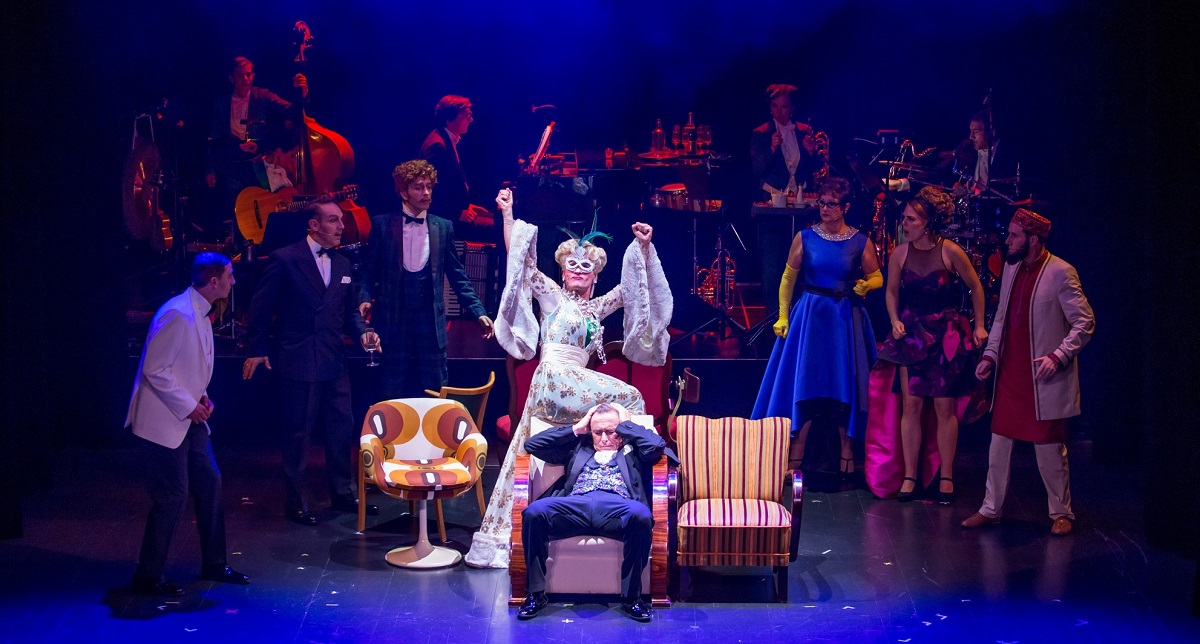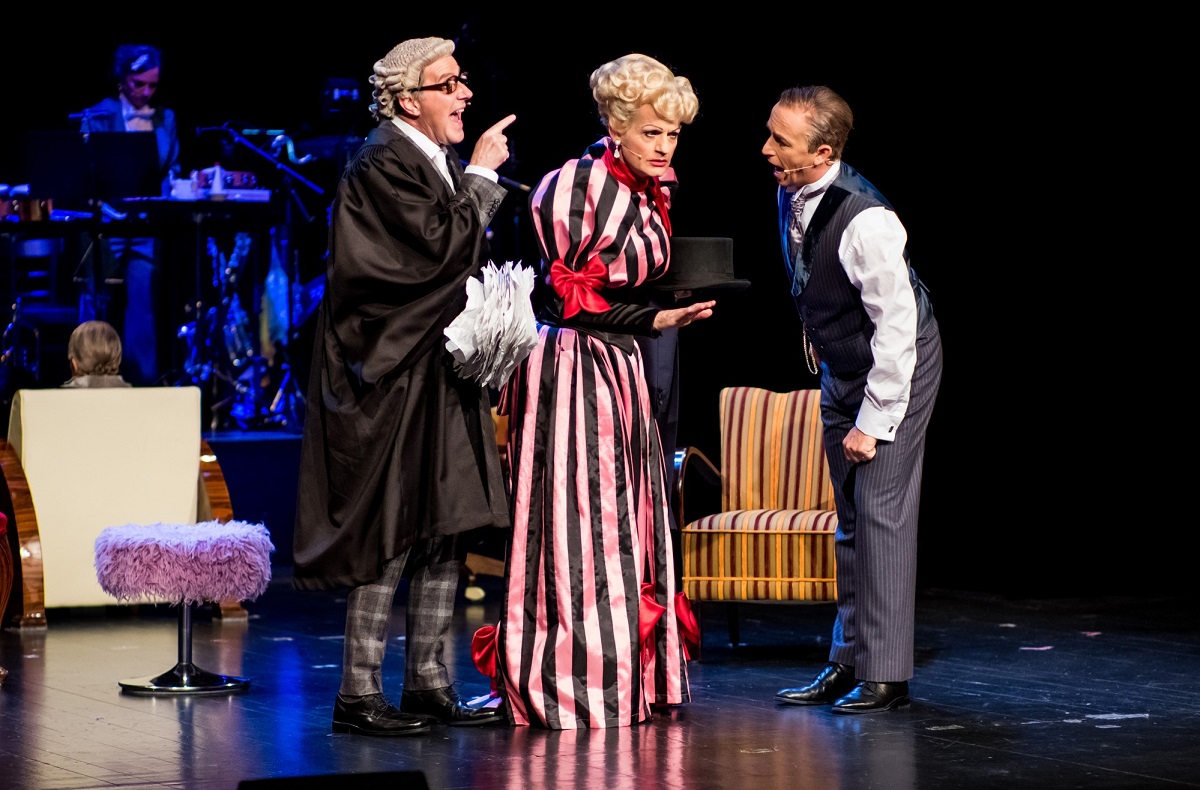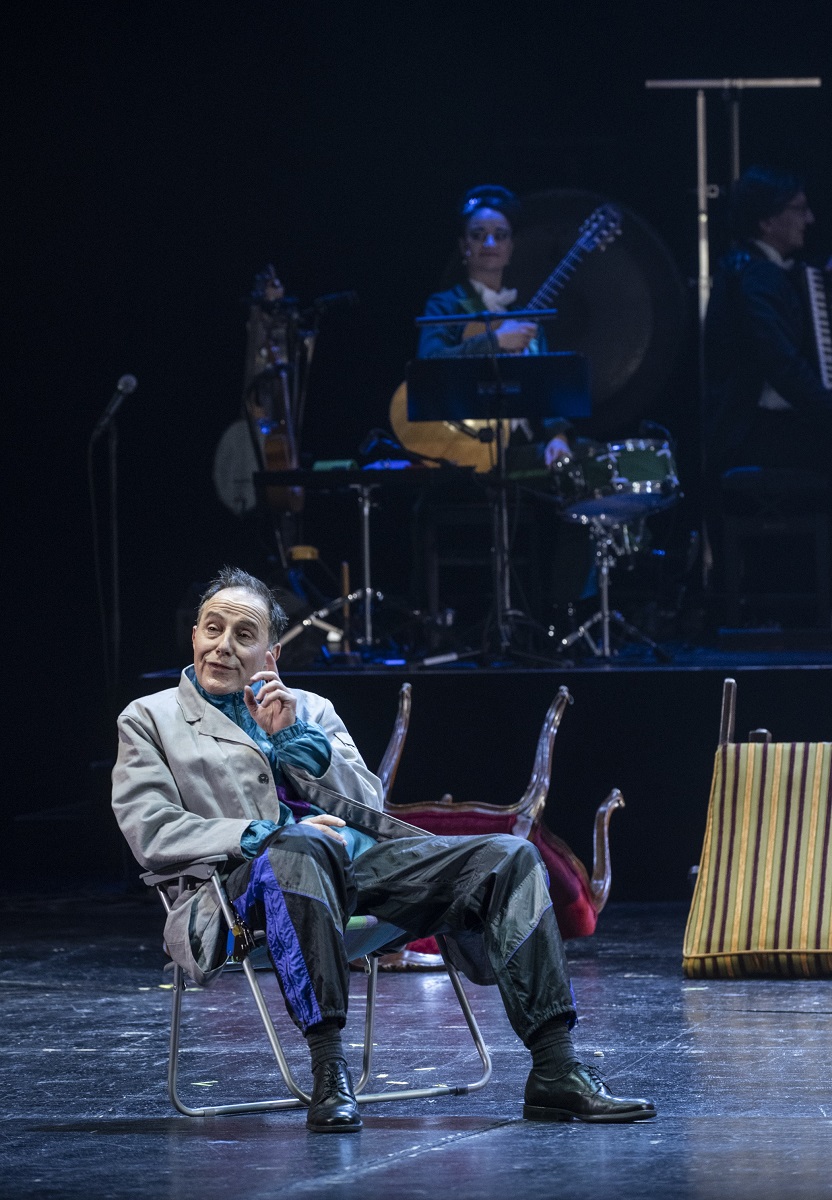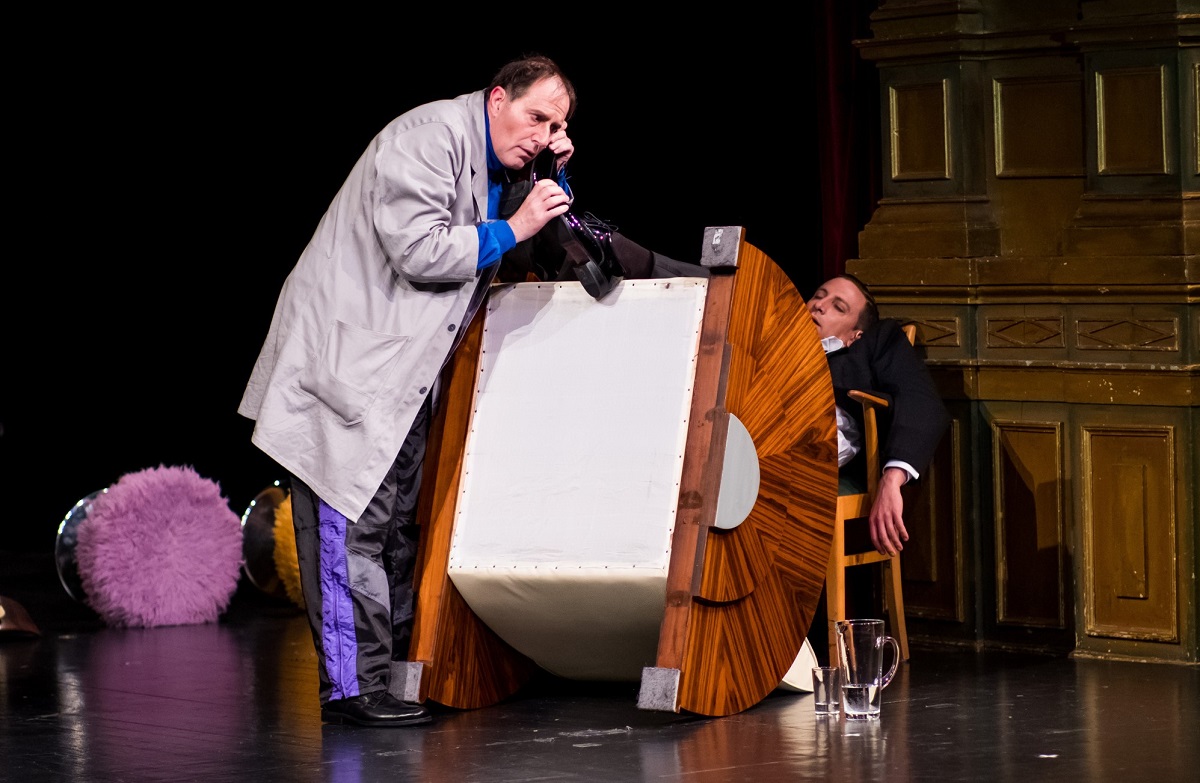Kevin Clarke
Operetta Research Center
12 February, 2023
After a long Corona delay this Fledermaus adaptation by Stefan Huber and Kai Tietje has finally landed in Berlin and opened at Komische Oper with a stellar cast that offers – as a unique selling point – Christoph Marti as a cross-dressed Rosalinde.

Christoph Marti (center) and the cast of “Die Rache der Fledermaus” at Komische Oper Berlin. (Photo: Michael Bigler – bigler.ca)
As you’ll recall, Mr. Marti is part of the Geschwister Pfister comedy team and has been seen earlier at Komische Oper in the title roles of Dostal’s Clivia and Abraham’s Roxy und ihr Wunderteam. By his side, then and now: tenor Tobias Bonn. All these productions were also directed by Stefan Huber, so you could see the new Fledermaus as a continuation of the previous queer operetta revolution at Komische Oper which ran in three waves: the Kosky stagings with Dagmar Manzel, the Christmas concerts that brought back rare operetta titles (such as Märchen im Grand-Hotel or Dschainah), and the Pfister/Huber offerings.
But this Fledermaus is not an “original” Komische Oper production, instead it was conceived for the Casinotheater Winterthur in Switzerland, where it also premiered. It was supposed to have moved on to Berlin much earlier, i.e. during the artistic reign of Mr. Kosky. But because of Corona it had to be postponed again and again. Till now.

A scene from act 1 with Stefan Kurt as Dr. Blind, Christoph Marti as Rosalinde, and Tobias Bonn as Eisenstein. (Photo: Michael Bigler – bigler.ca)
What differentiates this Fledermaus, newly entitled Die Rache der Fledermaus (“The Revenge of the Bat”), is that Mr. Tietje hasn’t adapted the score for the usual full orchestra of Komische Oper, instead the Johann Strauss music is reduced to a band of five players, with Tietje himself at the piano. However, the lush Strauss sound isn’t just reduced, it’s also rearranged in various more modern dance styles, somewhere between jazz lounge and ballroom. Which takes some getting used to, at least I didn’t take to this sound right away. (And I usually love operetta in dance band arrangements.)
On stage we see the actors dressed in three different styles, representing three different eras: the 1870s, the 1970s (think Boogie Nights), and the present day. This is also reflected in the styles of the chairs on stage, which are the only sets.
Moving the Fledermaus through time was already the concept of the Rolando Villzón production at Deutsche Oper Berlin in 2018. Here it is less obvious, because the stage is mostly empty and black, but above all: it doesn’t really have any impact on the way the music is sung. Take for example the fabulous Alen Hodzovic as a “disco singer” Alfred, in terms of costume. But he doesn’t sing the role disco style, apart from a few inserted pop lines here and there (which get big laughs). Tobias Bonn, in contrast, is a very “classic” operetta tenor, playing the role straight faced. And then there’s Gabriela Ryffel as an outstanding modern Adele, blending soubrette sounds with cheeky musical comedy elements à la Broadway.

The famous “Uhren-Duett” with Christoph Marti as Rosalinde and Tobias Bonn as Eisenstein. (Photo: Michael Bigler – bigler.ca)
It’s fun to see and hear, but it does not significantly add anything to the story as told by Stefan Huber. It leaves the spotlight to Mr. Marti as a pretty-in-pink Rosalinde. Why he only gets to sing one verse of “Mein Herr, was dächten Sie von mir” in the act 1 finale is a puzzlement. Because Mr. Marti makes Rosalinde – torn between social obligation to her husband and longing for her former suitor – come alive like few opera singers can, and this two verse chanson fits his husky baritone perfectly, much more than the high lying coloratura sections which he takes down two octaves.
The other spotlight attraction is Stefan Kurt as Frosch. Instead of the usual “Viennese” comedy routine, Mr. Kurt plays Frosch with a Swiss accent, dead pan Swiss humor, adding a Swiss pop song that he gets the entire auditorium to sing with him. It certainly lifts the latter parts of the show off the ground. It also made me regret that Mr. Kurt doesn’t get to say all the famous Frosch lines, it would have been treat to hear them from him (especially since the audience eats out of his hands).

Stefan Kurt as Frosch in “Die Rache der Fledermaus”. (Photo: Michael Bigler – bigler.ca)
The minimal staging looks a bit “empty” at Komische Oper, and the new sound of the band on stage (behind the actors) sounds weirdly “underpowered” in the large auditorium of an opera house (that has a full orchestra). But: the second performance I attended was completely sold out, there were hoards of young people who apparently didn’t miss the full Strauss orchestra and rejoiced in this big band arrangements (with the “Zucchini Sistaz “– in green outfits – playing all sort of instruments: Sinje Schnittker, Jule Balandat and Tina Werzinger.)
At the end, there were standing ovations for everyone, that includes Stephanie Dietrich as a remarkable Prince Orlofsky who gets to sing an expanded version of “Ich lad’ mir gerne Gäste ein”, and Max Gertsch as a agile Dr. Falke. Plus Franz Frickel as prison director Frank.

The prison scene between Stafn Kurt as Frosch (l.) and Franz Frickel as Falke. (Photo: Michael Bigler – bigler.ca)
There are performances till early March 2023. After that, it will be interesting to see whether the new artistic directors of Komische Oper will bring back Stefan Hubert and the Pfisters for future operetta projects, or whether this Rache der Fledermaus is their farewell to Behrenstraße. Let’s hope it isn’t!
Here’s the trailer from Winterthur, to give you a better acoustic and visual impression:
For more information, performance dates in Berlin and tickets, click here.
